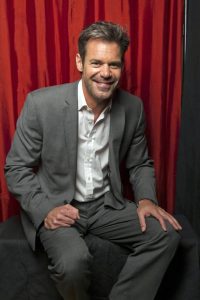
In the 1968 production of the controversial Mart Crowley play, The Boys in the Band, many of the actors playing gay characters in the cast were gay, but not all were openly gay. One of the few heterosexual cast members was actor Laurence Luckinbill—who was warned the role might ruin his career—playing a formerly straight man, “Hank,” who enters into a gay relationship. At the time, Luckinbill was married to actress Robin Strasser, later a star of the long-running soap opera One Life to Live. (He later married actress Lucie Arnaz.)
Strasser would later become a friend and mentor to her TV co-star Tuc Watkins, the Kansas City-born actor who is currently making his Broadway debut as “Hank” in the all-star Broadway revival of Boys in the Band which opened—with Jim Parsons, Matt Bomer, Zachary Quinto and Andrew Scott Rannells—on May 31st at the Booth Theater in New York City. In this production, celebrating the 50th anniversary of the play, all of the actors are openly gay.
Watkins, the son of noted local photographer Mary Watkins and businessman Charles Curtis Watkins III, is probably best-known for his tenure on popular TV series like One Life to Live and the primetime Desperate Housewives as well as the 1999 reboot of Universal’s film, The Mummy.
Living in New York City with his twin sons, Watkins responded to three questions from In Kansas City.
INKC: Boys in the Band was produced shortly before the Stonewall Riots (and some historians think might have been a component in the evolution of the riots), it has always had a particularly sensational quality. Do you think the play still holds its own after a half-century? Is it still as funny? As biting?
Watkins: The Boys in the Band is a timeless play that is uncompromising, blisteringly honest and as wickedly funny. In 1968 it was groundbreaking in the way that it explored how gay men treated each other and how they were meant to feel about themselves. While we have made strides in the past fifty years socially, culturally, and psychologically, we still live in a political environment that wants to back-pedal those accomplishments. And we must remember that the freedoms we in the LGBTQ community celebrate today came at a cost.
INKC: How has your Midwestern background influenced your career choices over the years? Or has it?
Watkins: My Midwestern upbringing hasn’t really influenced my career choices. What it has done is ground me. I feel like I showed up at the circus and had the ability to spot the clowns pretty easily.
INKC: You’ve had great success in television and film projects, but many performers claim that there’s nothing like the immediate rush of applause from a live theater audience. Is that a cliché or is it really that potent and intoxicating?
Watkins: I think we all share a cultural expectation that an audience will applaud at the end of a performance. But at the end of The Boys in the Band, a play about the gay experience, and the nine of us—nine out gay men—come to the edge of the stage and the audience leaps to their feet with enthusiasm, it is certainly invigorating.


